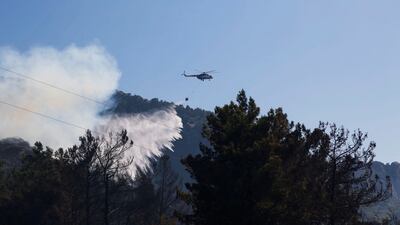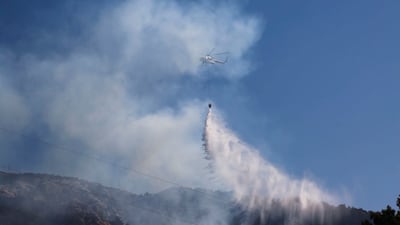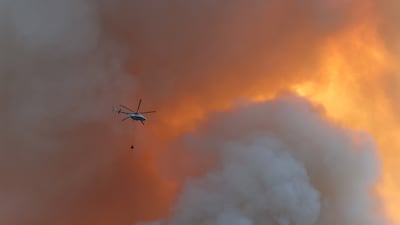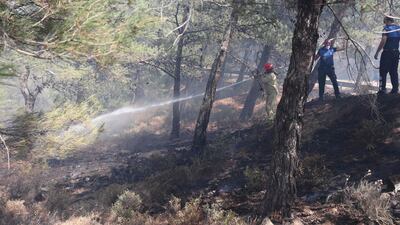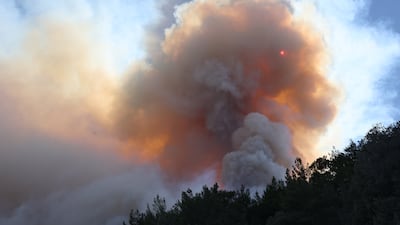Wildfires in Turkey have caused thousands to flee their homes as the spectre of last year's deadly blazes looms large.
On Wednesday, a fire broke out near an electrical transformer on the south-western Datca peninsula and began to spread due to strong winds.
“What makes our job a little more difficult is the wind effect, the direction and intensity of which are unpredictable,” Forestry Minister Vahit Kirisci said early on Thursday.
Turkey's Disaster Management Authority said about 450 houses had been evacuated and 3,530 people had fled as fires reached residential areas in the sparsely populated parts of the peninsula. The fire was brought under control about 24 hours after it started, authorities said on Thursday.
Footage from Wednesday showed smoke billowing from the woodlands as helicopters dumped water on the blazes as the flames spread. It also showed the garden of a house engulfed in smoke, with trees in the yard catching fire.
The Mugla province mayor's office said 17 houses and 728 hectares of land had been affected by the fire. It shared data that showed winds in the region had eased significantly on Thursday morning.
Health Minister Fahrettin Koca said 19 people had been injured in the fire and nine of them were still being treated in medical centres as of Thursday morning.
Authorities said 10 planes and 20 helicopters, including one that can operate at night, were involved in efforts to douse the flames.
Scientists say human-induced climate change is making heatwaves more likely and more severe.
The fires sparked fears of a repeat of Turkey's most destructive fire season ever, which occurred last year. Nine people died and more than 800 were injured during the 2021 wildfire season, and 140,000 hectares of land was burnt.
Turkey is at the beginning of its peak fire season, which usually runs for about 18 weeks.
Fires and deforestation have led to a 6.2 per cent decrease in tree cover since 2000.
Turkish President Recep Tayyip Erdogan has suggested severe punishments for those found guilty of setting fires, telling reporters after a blaze near the resort of Marmaris destroyed 4,500 hectares of Aegean coastal forest that the penalty should be “intimidating, and if that's a death sentence, it's a death sentence”.
Speaking to reporters in the eastern town of Agri at the end of June, Justice Minister Bekir Bozdag said the president's comments “are instructions to us”.
“We have started working on it as the ministry,” Mr Bozdag said and added that the current punishment for starting wildfires was 10 years in prison that could extend to a life sentence if the act was part of organised criminal activity.
Mr Kirisci, the forestry minister, said 88 per cent of forest fires in Turkey were started by humans.
